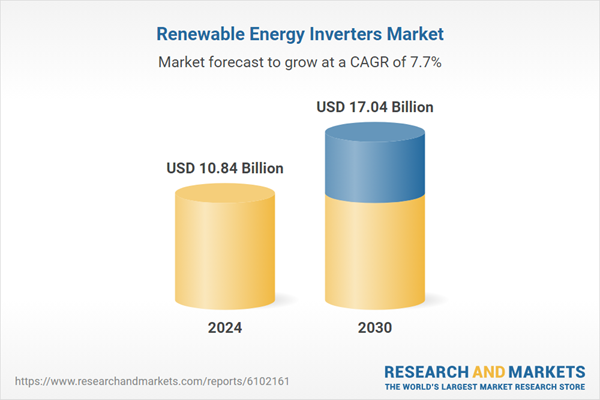Speak directly to the analyst to clarify any post sales queries you may have.
10% Free customizationThis report comes with 10% free customization, enabling you to add data that meets your specific business needs.
Key Market Drivers
Surging Global Adoption of Renewable Energy Sources Driving Inverter Demand
The rapid global transition to renewable energy, especially solar and wind, is significantly driving demand for inverters, which are crucial for converting generated DC into usable AC power. The widespread deployment of solar PV systems and wind farms, supported by declining technology costs and government incentives, necessitates advanced inverter technologies to manage grid stability and efficient energy flow. Countries such as China, India, and Germany are ramping up renewable capacity to meet ambitious climate targets, directly fueling demand for high-efficiency inverters. String, central, and microinverters are being deployed across varied scales - from homes to utility plants - addressing both localized and large-scale energy needs.Key Market Challenges
Grid Integration Complexity and Regulatory Disparities
A major challenge in the renewable energy inverters market lies in the integration of inverter-based systems into existing grid infrastructure, particularly in regions with outdated or inflexible power networks. Inverters must not only perform DC-AC conversion but also manage voltage, frequency, and phase synchronization with utility grids. The variable output of solar and wind systems adds complexity, requiring inverters to incorporate advanced features like voltage ride-through, anti-islanding, and reactive power support. These functional demands increase product costs and design complexity. Additionally, evolving grid standards and differing regulations across regions pose compliance challenges for manufacturers, necessitating constant innovation and adaptation in inverter design and software.Key Market Trends
Rising Integration of Energy Storage Systems with Inverter Technology
An emerging trend in the renewable energy inverters market is the growing use of hybrid inverters, which integrate energy storage capabilities. With renewable energy generation being inherently intermittent, energy storage is becoming essential for stabilizing power supply, reducing peak demand, and enhancing grid reliability. Hybrid inverters, which manage both solar input and battery storage, are gaining traction in residential, commercial, and utility sectors. These systems enable load optimization, seamless switching during outages, and effective use of time-of-use tariffs. Additionally, their compatibility with smart energy management systems enhances energy efficiency and operational control, making them attractive for modern energy infrastructures.Key Market Players
- Huawei Technologies Co., Ltd.
- Sungrow Power Supply Co., Ltd.
- SMA Solar Technology AG
- FIMER S.p.A.
- Power Electronics S.L.
- ABB Ltd.
- Enphase Energy, Inc.
- SolarEdge Technologies Inc.
- Delta Electronics, Inc.
- Ginlong Technologies (Solis)
Report Scope:
In this report, the Global Renewable Energy Inverters Market has been segmented into the following categories, in addition to the industry trends which have also been detailed below:Renewable Energy Inverters Market, By Type:
- String Inverters
- Central Inverters
- Microinverters
- Hybrid Inverters
Renewable Energy Inverters Market, By Phase:
- Single Phase
- Three Phase
Renewable Energy Inverters Market, By Application:
- Residential
- Commercial & Industrial
- Utility-Scale
Renewable Energy Inverters Market, By Region:
- North America
- United States
- Canada
- Mexico
- Europe
- Germany
- France
- United Kingdom
- Italy
- Spain
- South America
- Brazil
- Argentina
- Colombia
- Asia-Pacific
- China
- India
- Japan
- South Korea
- Australia
- Middle East & Africa
- Saudi Arabia
- UAE
- South Africa
Competitive Landscape
Company Profiles: Detailed analysis of the major companies present in the Global Renewable Energy Inverters Market.Available Customizations:
With the given market data, the publisher offers customizations according to a company's specific needs. The following customization options are available for the report.Company Information
- Detailed analysis and profiling of additional market players (up to five).
This product will be delivered within 1-3 business days.
Table of Contents
Companies Mentioned
- Huawei Technologies Co., Ltd.
- Sungrow Power Supply Co., Ltd.
- SMA Solar Technology AG
- FIMER S.p.A.
- Power Electronics S.L.
- ABB Ltd.
- Enphase Energy, Inc.
- SolarEdge Technologies Inc.
- Delta Electronics, Inc.
- Ginlong Technologies (Solis)
Table Information
| Report Attribute | Details |
|---|---|
| No. of Pages | 185 |
| Published | June 2025 |
| Forecast Period | 2024 - 2030 |
| Estimated Market Value ( USD | $ 10.84 Billion |
| Forecasted Market Value ( USD | $ 17.04 Billion |
| Compound Annual Growth Rate | 7.6% |
| Regions Covered | Global |
| No. of Companies Mentioned | 10 |









